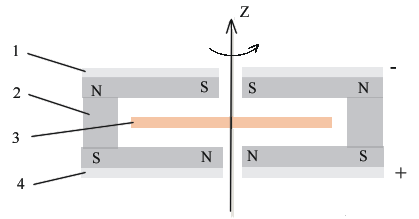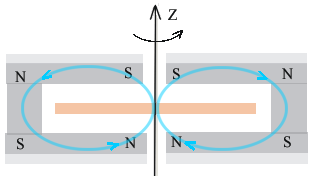
Fig.1

Fig.1a
A.A.Shpilman (
alexandrshpilman78@gmail.com)The EM-Mechanical Generator of Axion (Spin) field
|
Fig.1 |
|
|
Results of experiments on separation a component of "axion field" (see. N1/99) can be applied to development of generators of a new class.
Trere is an electro-magnet-mechanical generator of "axion field" (EMM) on Fig.1. The thin copper disk 3 rotates around an axis Z. The copper disk is made inside the hollow magnetic disk 2, which it's magnetized as is shown on Fig.1 and Fig.1a (it is possible to make a design simpler, which consist of three-four segments). Thus the magnetic disk have to have small electrical conductivity. The upper and lower surface of the magnetic disk is covered with aluminum - electrodes 1 and 4. Trere is the negative voltage on the electrode 1, and the positive voltage on an electrode 4, relatively copper disk.
The activity of the generator can be tried to describe as follows:
"THREAD" of "axion field" 5 (see Fig.2), having a positive electrical pseudo-charge, interact with a "negative" electrode 1 and pass upwards. Along this "THREAD" positive electrical pseudo-charges move from the outside to the copper disk 3, crossing area with a perpendicularly directional strong magnetic field, which created by a constants magnet 2.
|
|
"THREAD" of "axion field" 6, having negative electrical pseudo-charge, interact with a "positive" electrode 4 and pass downwards. Along this "THREAD" negative electrical pseudo-charge move from the copper disk 3 outside, also crossing area with a perpendicularly directional strong magnetic field created by a constants magnet 2.
At motion of the disk 3, how it is shown on Fig.2, in "THREADS", moving together with the disk perpendicular to a magnetic field of a magnet 2, the electric current is induced. Pseudo-electrical longitudinal current of pseudo-charges of "THREADS" is increased by this process (longitudial moment of an impulse is increasd).
If we shall change a direction of a magnetic field that, the longitudinal pseudo-current of pseudo-charges will decrease (thus, also will be generated "axion field", but smaller intensity and the generator will be like "a vacuum cleaner" to involve in itself Quons from the outside).
In both cases, the energy of "THREADS" is increased similarly to a compressed or stretched spring.
|
|
If we shall not submit on electrodes 1 and 4 "large" voltage, that "THREADS" of "axion field" will move from the generator at some angle to a plane of the disk (see Fig.3). In result common density of "axion field" will increase, but the longitudinal impulse of a beam moving from the generator, will decrease (and length of a beam will decrease). Such voltage is possible to pick up, at which maximum density of a field in specific area will be.
In difference from the earlier described generators using mechanical rotation, in the given generator main is the linear speed of motion of the copper disk (and intensity of a magnetic field). Therefore, "axion field" will have the form of a pipe moving upwards and downwards from perimeter of the copper disk.
In generation of "axion field" the main role is played a surface of the copper disk (it is characteristic for conductors), therefore it is meaningful to make it more thin as it is possible and carefully clear its surface.
For increasing of intensity of "axion field" it is possible to cover a lower surface of the copper disk with a thin layer of an "alloy Rose" (or tin), and to cover upper surface with a thin layer (spirituous of a solution) colophony. Probably, will be the interesting effects, if instead of the copper disk you will rotate fluids (melts). For example, mercury or gallium. If thus there will be hashing fluid, that the "actuated" nucleuses of atoms will be continuously move from a surface deep into of fluid, and on a surface will be continuously occur not actuated ones. Probably, thus, it will be possible to actuate all volume of fluid (melt, and then it is possible to cool a melt).
|
|
How, constants magnets and the ferrite have not infinitesimal conductivity that, it is meaningful to feed pulse voltage on electrodes 1 and 4 to ensure presence of an electrical field at a body of a constant magnet 2. But it also can be unsufficiently. Therefore, it will desirable to add aluminium (or graphite) covers of internal planes of the hollow magnetic disk (electrodes 7 and 8) as it is shown on Fig.4. In such case, relatively copper disk it is possible (roughly) to feed the following voltage on an electrode 1 - -3100 volts, 7 - -3000 volts, 8 - +3000 volts, 9 - +3100 volts. The maximum voltage moves on electrodes 7 and 8 and it is not causing spark discharge.
The efficaciousness of the given generator is very high, therefore be cautious and obey the accident prevention.
(see N3/95 , N5/95 , N2/96 , N3/96 , N2/97 , N1/98 , N2/98 , N1/99)